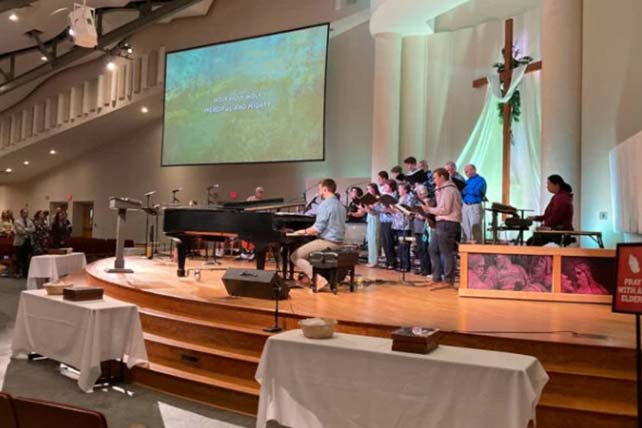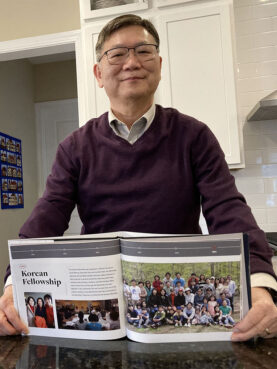The review noted that leaders of the Chinese fellowship felt the church had “stopped supporting the ministry.” It cited an elder who brought forth a survey he had personally conducted on racial attitudes at the church. His survey, the report said, was met with “silence” from the lead pastor, staff and other elders.
In 2022, church leadership asked members of a Sunday School class meeting online to discuss race and faith to stop meeting.
“The Chapel Hill Bible church had turned from a church that celebrated diversity to a church that had become inhospitable and unwelcoming to non-majority-culture people,” said Young Whang, an associate professor at the UNC School of Medicine who served as a deacon, chair of the deacon board and elder for three terms before resigning in 2022.
Young Whang and his wife, Sarah, built up a Korean fellowship at Chapel Hill Bible Church during their 20-plus years as members. He posed with a church anniversary book showing the fellowship. Most of its members have now left the church; so have the Whangs. RNS photo by Yonat Shimron
Whang and his wife, Sarah, a family physician, joined the church in 1999. Despite limited Korean language skills (both grew up in the U.S.), the couple took it upon themselves to build a Korean-language fellowship.They pleaded for help in ministering to these newer Christians. They even sought out Korean ministry candidates they hoped the church might hire. The church leadership passed on their recommendations.
Several months after their resignation, the church hired an Argentine of Korean heritage as the college minister.
But the Korean ministry is no more; the Chinese fellowship has been decimated by departures. One of 18 lay elders listed on the website is a Chinese American. The rest are white.
It took Sandy and Tin-Lup Wong a little longer to leave. They had been alienated from the church ever since Sandy was asked to care for the children at the women’s retreat. But there were many other insults.
Sandy Wong said church leaders routinely ignored her, walking away as she was talking to them.
One day when she was playing outdoors with the children, she fell and fainted. None of the adults also supervising the children came to her aid.
“I was so hurt, not just by the way they treated me but because they are doing God’s work,” she said.
On March 25, a group of 50, mostly ex-Bible church members, gathered in the sanctuary of a Methodist church in Chapel Hill for “A service of lament and healing for those wounded by the church.” Many people of color who had left the church attended.
The group told the Methodist minister who hosted them they did not want any preaching. That might be too triggering. They read psalms and Scriptures and sang songs instead. The Methodist church arranged for a few prayer ministers to be on hand.
The service concluded with “It Is Well With my Soul.” Old friends then embraced and prayed for each other’s healing. They vowed to support one another in lieu of the church that had failed them. Then they began talking of organizing more services for those wounded by the church.
This article originally appeared here.


